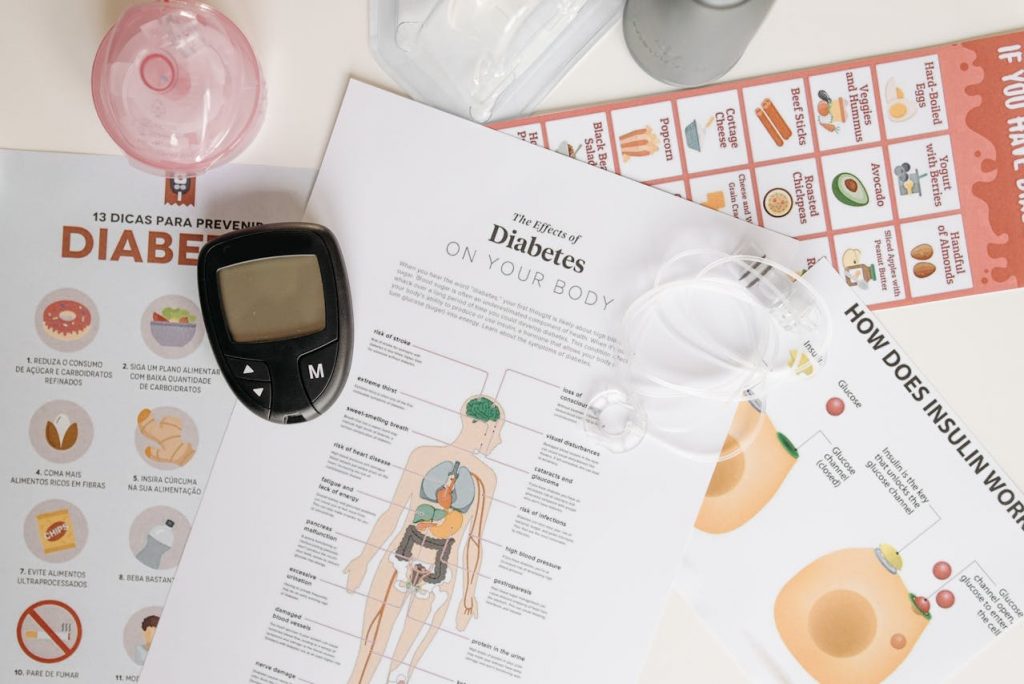
Weight management plays a critical role in the prevention and control of Type 2 diabetes. This blog explores the connection between body weight and blood glucose regulation, presents evidence-based approaches to weight-managed diabetes care, and offers practical resources for individuals and professionals seeking to improve outcomes through lifestyle interventions.
The Link Between Weight and Type 2 Diabetes
Type 2 diabetes is a metabolic disorder primarily characterised by insulin resistance and elevated blood glucose levels. Excess body weight, particularly central adiposity (fat stored around the abdomen), is a well-established risk factor for developing Type 2 diabetes. In fact, more than 85% of people with Type 2 diabetes are overweight or obese (CDC, 2022).
The mechanism is twofold:
- Adipose tissue dysfunction contributes to chronic inflammation and insulin resistance.
- Excess fat in the liver and pancreas impairs the body’s ability to regulate blood sugar effectively.
Weight Loss and Diabetes Remission
Encouragingly, weight loss has been shown not only to improve blood sugar control but, in some cases, to lead to remission of Type 2 diabetes. The landmark DiRECT (Diabetes Remission Clinical Trial) in the UK found that:
- 46% of participants who lost ≥10 kg achieved remission after one year.
- Those who maintained weight loss were more likely to stay in remission at two years.
“Remission of Type 2 diabetes is possible for many people through substantial weight loss, particularly early in the disease course.”
– Lean et al., The Lancet, 2018
This underscores the potential for non-pharmacological interventions to serve as first-line strategies.

Key Strategies for Weight-Managed Diabetes Control
Caloric Reduction and Portion Control
Moderate caloric deficits (e.g., 500–750 kcal/day) are often recommended. This can be achieved through:
- Balanced, nutrient-dense meals
- Reduced portion sizes
- Meal planning and structured eating routines
Resource: NHS Live Well – Eating a balanced diet
Low-Energy or Total Diet Replacement (TDR)
TDR programmes (e.g., soups, shakes) under clinical supervision have demonstrated efficacy. These were used in the DiRECT study to induce rapid weight loss in a safe and structured manner.
Recommended reading: Diabetes UK Low-Calorie Diet Programmes
Physical Activity
Regular aerobic and resistance training improves insulin sensitivity and supports fat loss. Guidelines typically recommend:
- 150+ minutes/week of moderate aerobic activity
- 2 sessions/week of muscle-strengthening exercises
Evidence: The Look AHEAD study (Action for Health in Diabetes) showed improvements in HbA1c and cardiovascular risk factors among overweight adults with Type 2 diabetes who adopted intensive lifestyle interventions (The New England Journal of Medicine, 2013).
Behavioural and Psychological Support
Sustainable weight loss often requires addressing emotional eating, motivation, and stress. Behaviour change techniques include:
- Goal setting and self-monitoring
- Cognitive Behavioural Therapy (CBT)
- Coaching and peer support
Tool: NICE guidelines on behavioural weight management
Health Coaching as a Catalyst for Change
Health coaches trained in behavioural science and lifestyle medicine can be pivotal in supporting weight-managed diabetes care. Their role often includes:
- Encouraging goal-directed behaviour
- Supporting self-efficacy and accountability
- Providing non-judgemental, client-led guidance
“The addition of a health coach to primary care has been associated with improved self-care, weight management, and reduced HbA1c.”
– Wolever et al., Journal of the American Board of Family Medicine, 2010
Explore: UKIHCA – Find a Health Coach
Considerations and Cautions
- Weight cycling (yo-yo dieting) can undermine long-term metabolic health. Sustainable strategies are key.
- Medication interactions: Weight loss may necessitate adjustments in diabetes medications to avoid hypoglycaemia.
- Not everyone will achieve remission but improved glycaemic control and reduced complications are valuable outcomes in themselves.
Further Reading and Resources
|
Resource |
Description |
|
Comprehensive guide to living well with diabetes |
|
|
Nutrition and weight management advice |
|
|
Evidence-based resources on weight management |
|
|
Guidelines on managing obesity and diabetes |
|
|
Insights and outcomes from the UK remission trial |
Final Thoughts
Weight-managed diabetes control is more than just weight loss. It is about empowering individuals with the knowledge, tools, and support systems to take meaningful, sustained action towards better health. When applied early and strategically, lifestyle-based interventions can not only improve quality of life but in many cases, offer the hope of remission.
For health professionals and individuals alike, this represents a shift toward prevention-oriented, person-centred care – an approach that holds promise for tackling the diabetes epidemic from its root.
Images: Pexels.com

